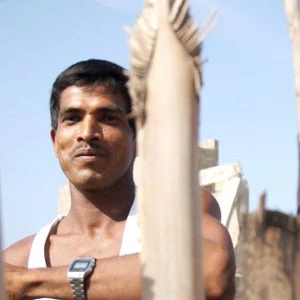
Join Deepan for a live chat on Tuesday, March 5 at 4:00 p.m. Sri Lanka time. Location: facebook.com/worldbanksrilanka.
Gender norms and stereotypes not only affect women, they have an impact on men too. As a child whose father lost his job, I had to quit school and pick up the responsibilities of a man, to support my family financially. It has been more than 13 years and I have never stopped working; this is stressful. Studies show that men’s stress and childhood trauma increase the probability of them perpetrating violence against their partners, in comparison with a man who hasn’t had a stressful life or a traumatic childhood.
Of course, I don’t beat women, harass them, or even tease them because of my difficult upbringing. I guess most of you share the same sentiment. If I’m not someone who perpetuates violence against women and girls, then why is it my problem, right? I’m a good guy, I respect women, I treat them equally and definitely have never harmed them physically, so why worry about all of this?
I used to think the same, until an incident changed my life and made me realize my potential to be the ”other man,” someone who can easily exert his power on someone who is perceived to be less powerful, softer-spoken, more emotional and weak. This changed everything for me, the way I perceived my role in supporting the fight for equal rights for women, for prevention of gender-based violence.
I realized, while I stayed on the sidelines because I didn’t rape or abuse women, there were men doing such horrible things to women, girls and children. They were defining a type of man that the world – especially women – was beginning to hate, and this influenced the way every woman looked at a man. This troubled me, because I have enjoyed the love of many women in my life. I know not all men were the same, but this didn’t make a difference until I started stepping out to the streets for them, started speaking out on their behalf. I realized that I had a bigger role to play. I needed to be an ally to women, to fight against abuse and violence, because the truth is what violates them, violates me.
Men and boys are the perpetrators. There is no way we can prevent violence against women by continuing to teach women to “say no to rape” – no one asks or wants to be raped. We need to tell our friends, brothers, fathers, and other men, “don’t rape.” We need to intervene, call out and step up to make sure no women or child is ever raped again.
I strongly believe that working with men and boys has been the missing link in this work on gender-based violence, not only to work with men who rape and abuse, but to understand the masculine notions that contribute to their perpetration of violence, which most times affect them too. It is also important to work with men who are leading by example, who respect, share, love, protect, and treat women with equality. Men have a big role to play in society. Their involvement in their children’s lives can break the cycle of violence; men being better husbands and fathers will definitely have an impact on the man that a child may become.
Now is the time for us men to come out of our complicit violence toward women. Our silence is also a form of violence against women. What are we afraid of? That we will be less of a man?
Step up, show up, and stand shoulder to shoulder with women in this challenging journey to end gender-based violence. Why? Because it’s the right thing to do and because you are man enough to do it!


Join the Conversation